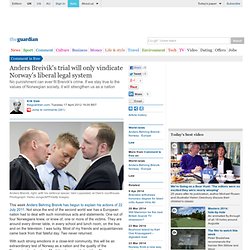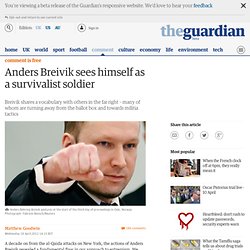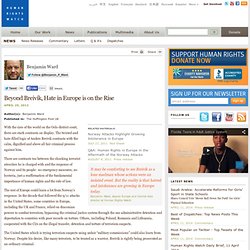

Breivik's toxic legacy. The terror of Oslo and Utøya has given us Norwegians a shared trauma that will stay with us for ever. We are also bonded by our sympathy for the survivors, and the family and friends of the 77 people killed last July. In the aftermath of the attack we gathered in marches and public displays of sorrow. But I fear this response differs little from how we would have reacted to a natural disaster or a fatal accident of the same dimensions. As the trial against self-confessed killer Anders Behring Breivik starts, Norwegian politics seems to be back to normal. Though Behring Breivik's deeds, trial and psyche totally dominate the national media, we seem to be shying away from the political matters close to the terrorist's heart. This winter Norway signed an agreement to return young asylum seekers to Ethiopia.
In the same manner, the debate on Islam and Islamophobia has hardened rather than softened after 22/7. Both these subjectsgo to the core of Behring Breivik's ideology. Anders Breivik's trial will only vindicate Norway's liberal legal system. Anders Breivik, right, with his defence lawyer, Geir Lippestad, at Oslo's courthouse.

Photograph: Heiko Junge/AFP/Getty Images This week Anders Behring Breivik has begun to explain his actions of 22 July 2011. Not since the end of the second world war has a European nation had to deal with such monstrous acts and statements. One out of four Norwegians knew, or knew of, one or more of the victims. They are around every dinner table, in every school and lunch room, on the bus and on the television. With such strong emotions in a close-knit community, this will be an extraordinary test of Norway as a nation and the quality of the Norwegian legal system. The first challenge is to accept that no punishment can ever fit the crime. We should be outraged by the ideas that motivate him, but if we deny him the chance of explaining himself in an open court, we let the essence of those ideas, oppression and intolerance, dominate us.
The third and last challenge is to see and accept one another. Anders Breivik sees himself as a survivalist soldier. A decade on from the al-Qaida attacks on New York, the actions of Anders Breivik revealed a fundamental flaw in our approach to extremism.

We had become accustomed to viewing the extreme right only as an electoral force – and dismissed its potential to enact mass violence. Breivik, however, has reminded us that within the European far right there is a school of thought that considers the ballot box strategy a lost cause. "We've had radical right parties for 30 years", so the argument goes, "but immigrants are still arriving and Muslim communities are still growing. " At a less extreme level, this line of argument prioritises direct action over electoral politics, and is reflected in the emergence of various defence leagues and counter-jihad groups – some of whom have had to backtrack after allegedly sympathising with the concerns of Breivik.
Last summer some claimed Breivik was simply an extreme outlier: a loner driven by irrational impulses. Beyond Breivik, Hate in Europe is on the Rise. With the eyes of the world on the Oslo district court, there are stark contrasts on display.

The twisted and hate-filled logic of Anders Breivik contrasts with the calm, dignified and above all fair criminal process against him. There are contrasts too between the shocking terrorist atrocities he is charged with and the response of Norway and its people: no emergency measures, no hysteria, just a reaffirmation of the fundamental importance of human rights and the rule of law. The rest of Europe could learn a lot from Norway’s response. In the decade that followed the 9/11 attacks in the United States, some countries in Europe, including the UK and France, relied on draconian powers to combat terrorism, bypassing the criminal justice system through the use administrative detention and deportation to countries with poor records on torture.
Others, including Poland, Romania and Lithuania, cooperated with the CIA on the illegal transfer, detention and torture of terrorism suspects.